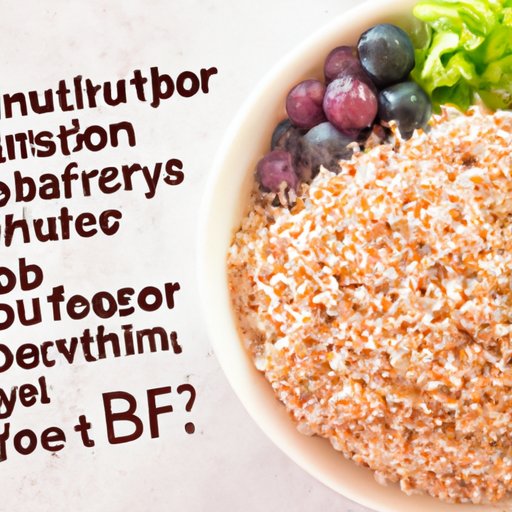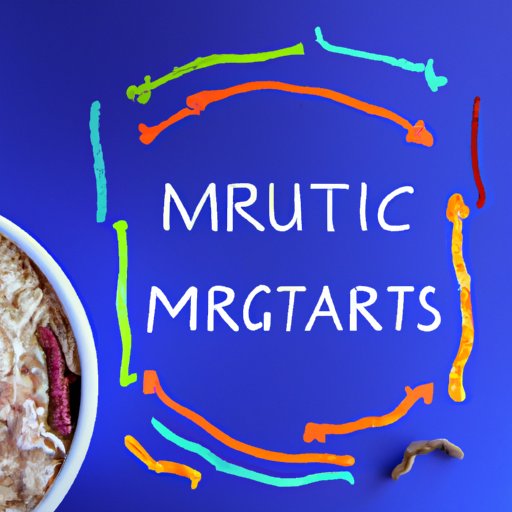I. Introduction
Having a healthy gut microbiome is essential for overall health and wellbeing. The human gut contains trillions of microorganisms that play a crucial role in digestion, immune function, and even mental health. In this article, we will explore ten foods, five habits, the power of probiotics, the importance of fiber and prebiotics, easy recipes, and how to manage stress to promote a healthy gut microbiome.
II. 10 Foods That Will Promote a Healthy Gut Microbiome
Eating a healthy, balanced diet that is rich in fiber and nutrients is essential for promoting a healthy gut microbiome. Here are ten foods that can help:
- Yogurt and other fermented foods
- Sauerkraut
- Kimchi
- Kefir
- Tempeh
- Miso
- Garlic
- Onions
- Jicama
- Artichokes
These foods contain beneficial bacteria and nutrients that can help promote a healthy gut microbiome. Incorporating them into your diet is an easy way to support your gut health.
III. 5 Habits to Improve Your Gut Health
In addition to eating a healthy diet, there are other lifestyle habits you can adopt to improve your gut health:
- Eating slowly and mindfully
- Staying hydrated
- Getting regular exercise
- Getting enough sleep
- Reducing stress
Adopting these habits can help promote healthy digestion and overall gut health.
IV. The Power of Probiotics: How They Enhance Your Gut Microbiome
Probiotics are “good” bacteria that can benefit the gut microbiome. They are found in many fermented foods like yogurt, kefir, and sauerkraut, as well as in supplement form. Here are some benefits of probiotics for the gut microbiome:
- Improve digestion
- Boost immune function
- Reduce inflammation
- Improve mental health
- Prevent and treat diarrhea
There are many different types and strains of probiotics, so it’s important to choose one that is right for you. Consult with your healthcare provider to determine which probiotic supplement or food is best for your needs.

V. Why Fiber is Important for a Healthy Gut Microbiome
Fiber is an essential nutrient that provides many benefits for the gut microbiome. It helps promote healthy digestion by bulking up stool and reducing constipation. Here are some types of fiber and their benefits for the gut microbiome:
- Insoluble fiber: adds bulk to stools
- Soluble fiber: helps regulate blood sugar and cholesterol
- Resistant starch: feeds beneficial bacteria in the colon
The recommended daily intake for fiber varies depending on age and gender but generally ranges from 21-38 grams per day for adults. Eating a variety of fruits, vegetables, and whole grains will help you meet your daily fiber needs.
VI. The Role of Prebiotics in Maintaining a Healthy Gut Microbiome
Prebiotics are a type of fiber that helps “feed” the beneficial bacteria in the gut microbiome. They are found in many fruits, vegetables, and whole grains. Here are some benefits of prebiotics for the gut microbiome:
- Promote the growth of beneficial bacteria in the gut
- Improve digestion
- Boost immune function
- Reduce inflammation
Some sources of prebiotics include bananas, onions, garlic, and whole grains. Including these foods in your diet can help promote a healthy gut microbiome.
VII. 5 Easy Recipes to Boost Your Gut Health
Here are five easy and healthy recipes that can help promote a healthy gut microbiome:
- Banana and almond butter smoothie
- Roasted garlic hummus
- Grilled tempeh and veggie kabobs
- Quinoa and roasted vegetable salad
- Thai vegetable curry
These recipes include ingredients like garlic, onions, tempeh, and whole grains that are beneficial for the gut microbiome.
VIII. The Connection Between Stress and Your Gut Microbiome
The gut-brain axis is a bidirectional communication system between the gut and the brain. Stress can affect the gut microbiome by altering the balance of bacteria and aggravating conditions like irritable bowel syndrome (IBS). Here are some tips for managing stress and promoting gut health:
- Practice relaxation techniques like deep breathing and meditation
- Exercise regularly to reduce stress
- Get enough sleep to support overall health
- Talk to a mental health professional if you are experiencing chronic stress or anxiety
IX. Conclusion
A healthy gut microbiome is essential for overall health and wellbeing. By eating a healthy diet, adopting lifestyle habits that promote gut health, incorporating probiotics and prebiotics, and managing stress, you can support a healthy gut microbiome and promote optimal health.
Prioritizing your gut health may take some effort, but the benefits are well worth it. By incorporating the tips and recommendations outlined in this article, you can take control of your gut health and live a happier, healthier life.
(Note: Is this article not meeting your expectations? Do you have knowledge or insights to share? Unlock new opportunities and expand your reach by joining our authors team. Click Registration to join us and share your expertise with our readers.)
